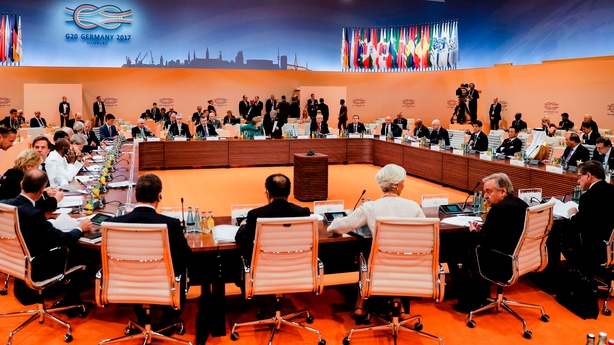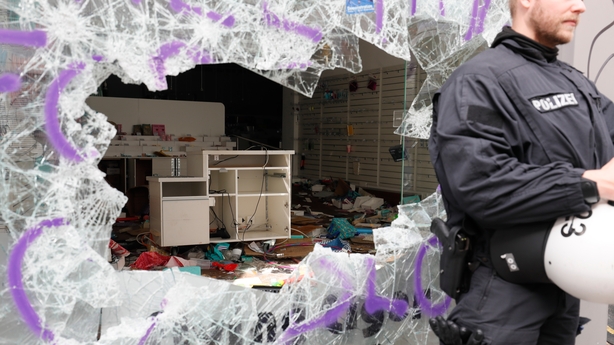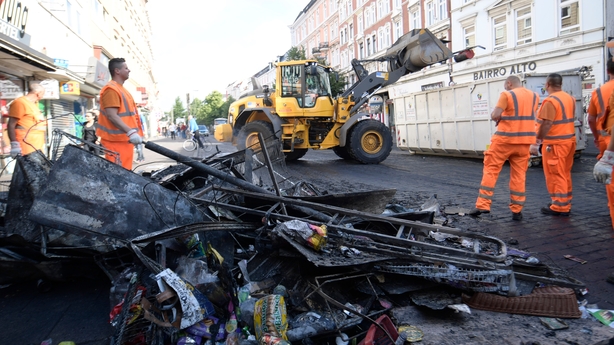The final statement from Group of 20 leaders today exposed a divide between the United States and other G20 members on the Paris accord aimed at combating climate change.
German Chancellor Angela Merkel, hosting the two-day G20 summit, said she was pleased all club members besides the United States had agreed the Paris climate accord was irreversible.
"I think it's very clear that we could not reach consensus, but the differences were not papered over, they were clearly stated," Ms Merkel told reporters at the end of the two-day meeting.
We need your consent to load this rte-player contentWe use rte-player to manage extra content that can set cookies on your device and collect data about your activity. Please review their details and accept them to load the content.Manage Preferences
She said she did not share the view of British Prime Minister Theresa May who said yesterday she thought Washington could decide to return to the climate agreement.
In the final communique, the G20 leaders took note of the United States' decision to withdraw from the landmark accord.
"The leaders of the other G20 members state that the Paris Agreement is irreversible," the statement read.
On trade, another sticking point, the leaders agreed they would "fight protectionism including all unfair trade practices and recognise the role of legitimate trade defence instruments in this regard".

Mr Trump, who yesterday found chemistry in his first face-to-face meeting with Russian President Vladimir Putin, congratulated Ms Merkel on her stewardship of the summit.
"You have been amazing and you have done a fantastic job. Thank you very much chancellor," he said.
G20 leaders including Donald Trump agree a joint position on trade, but remain at odds over climate change https://t.co/WQ60ZBE1Mw pic.twitter.com/7LKPU2EVZy
— RTÉ News (@rtenews) July 8, 2017
Yesterday, Mr Trump and Mr Putin discussed alleged Russian meddling in the US election but agreed to focus on future ties rather than dwell on the past, a result that was sharply criticised by leading Democrats in Congress.
For Ms Merkel, the summit was an opportunity to show off her diplomatic skills ahead of a federal election in September, when she is seeking a fourth term in office.
She treated the leaders to a concert at Hamburg's Elbphilharmonie last night, where they listened to Beethoven while their aides began an all-night slog to thrash out the consensus on trade that had eluded the leaders.
Trade policy has become more contentious since Mr Trump entered the White House promising an "America First" approach.
Ms Merkel chose to host the summit in Hamburg, the port city where she was born, to send a signal about Germany's openness to the world, including its tolerance of peaceful protests.
As the leaders met today, police helicopters hovered overhead. Overnight, police clashed with anti-capitalist protesters seeking to disrupt the summit.


After a night of rioting in which radicals looted shops, hurled objects and set alight street barricades, the city centre was in lock-down with luxury shops along the main streets barricaded up and many protected by security guards.
At least 40,000 people had gathered by lunchtime today and police in riot gear lined the streets. The anti-globalisation ATTAC movement, which organised the march, said it expected about 100,000 people to attend.
The head of Hamburg police earlier warned he expected radicals to mingle with the 'G20 - not welcome!' demonstration and expressed shock at the "wave of destructive anger", rioting and arson seen since Thursday.
Mostly young protesters, some holding balloons, others pushing prams, wanted to keep the demonstration peaceful.
However, in the last three days, more than 200 police officers have been injured. Some 143 people have been arrested and 122 taken into custody. The number of injured protesters was not available.
G20 launches plan to fight poverty in Africa
G20 nations launched an unprecedented initiative to fight poverty in Africa, but critics called the plan half-hearted.
Under Ms Merkel's "Investment Compacts", an initial seven African countries would pledge reforms and receive technical support in order to attract new private investment.
More than half of Africans are under 25 years old and the population is set to double by mid-century, making economic growth and jobs essential for the young to stop them from leaving, Ms Merkel has said.
Germany's partner nations are Ghana, Ivory Coast and Tunisia, while Ethiopia, Morocco, Rwanda and Senegal are also taking part.
Some 100,000 people, most of them sub-Saharan Africans, have made the dangerous journey to Europe across the Mediterranean in rickety boats this year as the migration crisis shows no sign of abating.
Anti-poverty group ONE said that the investment compacts "promised much, but too many G20 partners missed the memo and failed to contribute. The flimsy foundations must now be firmed up, follow through and improved, especially for Africa's more fragile states."

